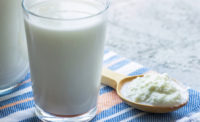
Checkoff-led consumer research indicates that people believe the digestive system and microbiome are important not just for gut health but also for immunity, and mental and metabolic health. By simply typing “gut health” into a Google search, more than 1.7 billion results pop up, showing the desire to learn more. This is an area where consumer interest and scientific reality align. There’s a strong body of evidence on the wellness benefits of dairy foods on digestive health and newer, emerging evidence on how good gut health appears to be a gateway to better overall health.
The intestinal tract contains the body’s largest number of immune cells, which constantly interact with our gut microbiota to help maintain gut health. It is important to strike a balance between “good” and “bad” bacteria within our gut to reduce risk of a cascade of issues, so there’s growing interest in keeping the good bacteria well-nourished.
Information on how best to nourish gut bacteria needs to be accessible to consumers to help them understand how to keep their gut in optimal condition. Dairy foods, particularly fermented options such as yogurt and kefir, can help promote a healthy gut microbiome. The fermentation process transforms milk into popular dairy foods, such as yogurt, hard cheeses, and kefir.
Fermentation can impact the nutritional value of foods, producing additional bioactives, such as peptides and short-chain fatty acids, which can have a positive impact on digestion, absorption, and metabolism. This is likely a key reason fermented foods are linked to reduced inflammation and other health benefits. Fermented foods containing live cultures like yogurt and kefir can add beneficial bacteria to the digestive tract, helping maintain a healthy microbiota and gut barrier function.
A strong and growing body of evidence demonstrates fermented dairy foods support healthy digestion and reduce the risk of some diseases, like metabolic disorders, cardiovascular disease, immune-related diseases, and cognitive decline.
Additionally, a recent systematic review assessed more than 100 studies over nearly 40 years and found that fermented dairy foods provide many health benefits. One such benefit was the direct, causal link found between yogurt consumption and improved lactose digestion and tolerance.
Lactose intolerance is one important aspect of gut health consumers care about, and this is an area where the bacteria used to make yogurt, Lactobacillus bulgaricus, and Streptococcus thermophilus, have been specifically studied for their ability to help people digest lactose (i.e., the sugar in milk). For people with lactose intolerance, yogurt, kefir, and hard cheeses can often be tolerated. There is minimal (less than 1 gram) lactose in hard cheeses (e.g., Cheddar, Parmesan, Gouda, etc.) and for yogurt and kefir, the live cultures help break down the lactose into lactic acid, making it easier to digest. Fermented dairy foods are important options for culturally appropriate diets — meeting the needs of those who have difficulty digesting lactose.
Other beneficial associations were found between fermented dairy foods and reduced risk of breast and colorectal cancer, type 2 diabetes, cardiovascular disease, improved weight maintenance, bone health, and gut health.
Because fermented dairy foods remain popular among consumers, this is a viable area for further research and promotion led by National Dairy Council thanks to dairy checkoff investment. Looking ahead, our research efforts will include ongoing discovery to understand how fermented dairy foods impact the gut-brain axis and mental health.
Sharing this science-based information about how dairy foods can help supercharge digestive wellness and a broader connection to holistic health is important to meeting consumers’ needs and active lifestyles.




